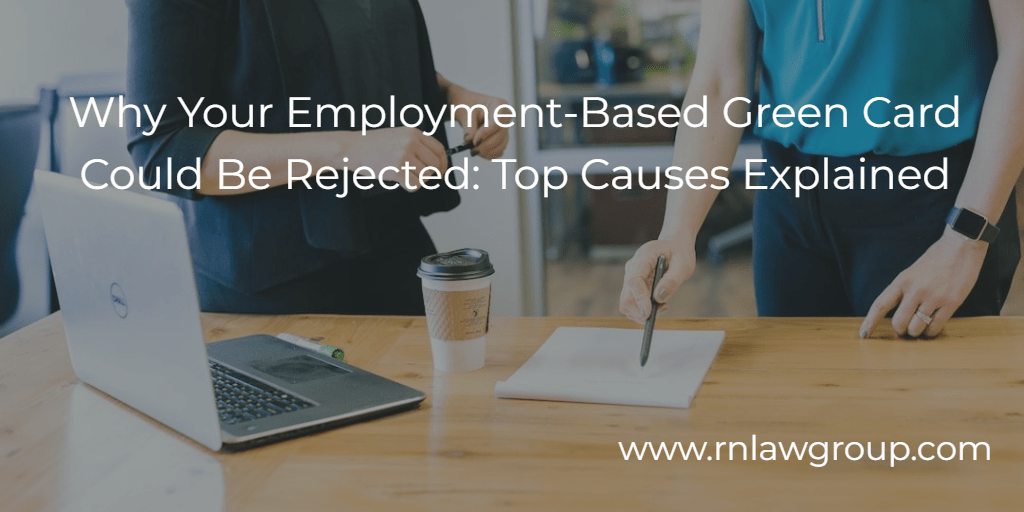
Why Your Employment-Based Green Card Could Be Rejected: Top Causes Explained
Applying for an employment-based green card is a significant and exciting step, but the process is often complex and filled with potential pitfalls. Even when you follow all the required steps, unexpected denials can occur. Whether it’s due to minor paperwork errors or complex legal issues, understanding the reasons for a green card rejection can help you avoid these problems. In this guide, we’ll break down the top causes of employment-based green card denials, focusing on common grounds of inadmissibility, the Adjustment of Status process, and how to navigate the Visa Bulletin. By being informed and proactive, you can improve your chances of a successful application.
Understanding Inadmissibility: The Key to Avoiding Denials
One of the most critical aspects of applying for a green card, whether through the Adjustment of Status (AOS) process or consular processing, is the concept of inadmissibility. U.S. immigration law outlines several grounds on which an applicant can be deemed ineligible to enter or remain in the United States, regardless of their qualifications for a green card. These grounds are varied, ranging from health concerns to immigration violations, and some can be overcome with waivers, while others may lead to permanent bars from immigration. Below are the main grounds of inadmissibility and what they mean for green card applicants.
Health-Related Grounds
Health-related inadmissibility is a concern for some applicants. Certain contagious diseases, like tuberculosis, or the failure to provide proof of required vaccinations can result in a denial. Additionally, mental health disorders that are associated with harmful behavior may also lead to inadmissibility. To avoid issues, applicants must undergo a medical examination by a designated civil surgeon who will ensure all health-related requirements are met.
Criminal Grounds
A criminal history can lead to green card denial, especially if the offenses are severe. Crimes involving moral turpitude, drug trafficking, human trafficking, money laundering, or violent crimes can make an applicant inadmissible. While minor offenses might not result in a bar, more serious criminal convictions, particularly felonies, can permanently prevent an applicant from receiving an immigrant visa.
Security Grounds
Applicants deemed a threat to U.S. national security are automatically inadmissible. This category includes individuals involved in terrorism, espionage, or sabotage. Any association with terrorist organizations or activities that compromise national security can result in a permanent denial of an immigrant visa.
Public Charge Grounds
The public charge rule assesses whether an applicant is likely to become dependent on U.S. government benefits for their subsistence. If the government believes an applicant may become a public charge, their green card application may be denied. Factors such as age, health, financial resources, education, and family size are considered when making this determination. It’s important to have a solid financial plan in place to avoid falling under this ground of inadmissibility.
Misrepresentation and Fraud
Providing false information or misrepresenting facts on an immigration application can lead to a permanent bar. Even minor misrepresentations, whether during the application process or in an interview, can result in denial. Fraudulent claims, such as lying about qualifications or relationships, are taken very seriously by U.S. immigration authorities, though waivers may be available in some cases.
Unlawful Presence
Unlawful presence in the United States can result in significant bars to reentry. If an applicant has overstayed a visa for more than 180 days, they may face a 3-year bar, and if the overstay exceeds one year, a 10-year bar may apply. Exceptions to this rule exist for minors and those who qualify for waivers, but understanding and addressing unlawful presence issues before applying is crucial.
Prior Deportations or Unlawful Entry
If an applicant has been deported from the United States or removed for any reason, they may be inadmissible when applying for a green card. Additionally, unlawfully re-entering the U.S. after deportation without permission, known as consent to reapply, can lead to further legal complications and a denial of their green card.
Labor Certification and Immigration Violations
Any person seeking to enter the United States to work in a skilled or unskilled job is considered inadmissible unless the U.S. Department of Labor certifies two key factors. First, they must confirm that there are not enough U.S. workers who are able, willing, and qualified to take the job at the time and place it’s needed. Second, they must ensure that hiring the foreign worker will not negatively affect the wages and working conditions of similarly employed U.S. workers. Without this labor certification, the foreign worker is considered to be inadmissible. In addition, anyone who enters the United States without legal permission, such as being admitted or paroled, or who arrives at a place not approved by the government, is considered inadmissible. Additionally, if a person fails to attend their removal hearing without a valid reason, they will also be considered inadmissible if they try to re-enter the U.S. within five years after leaving or being removed.
Polygamy and Child Abduction
U.S. immigration law also prohibits polygamy, and individuals who have engaged in the practice may be denied a green card. Additionally, involvement in international child abduction or custody disputes that violate international treaties can lead to inadmissibility.
Miscellaneous Grounds
Other grounds for inadmissibility include involvement in human smuggling, violations of religious freedom, and breaches of immigration status such as overstaying visas. Addressing these issues ahead of time, through waivers or legal remedies, is crucial to ensure that they do not result in the denial of your green card application.
Meeting the Requirements for Adjustment of Status
For those applying for a green card within the United States through the Adjustment of Status (AOS) process, there are additional eligibility requirements that must be met. These include demonstrating lawful entry into the U.S., maintaining a valid immigration status up to the time of filing, and having an approved immigrant petition with a current priority date. Failing to meet any of these requirements can result in the denial of your green card application. It’s essential to carefully review your eligibility for AOS, as not qualifying can force you to pursue consular processing, which can be more time-consuming and complex.
Navigating the Visa Bulletin: How to Check Your Priority Date
When filing for an employment-based green card, one crucial factor is ensuring that your priority date is current. The priority date is the date your employer filed the labor certification or Form I-140 on your behalf, and it determines your place in line for a green card. The U.S. Department of State’s Visa Bulletin, updated monthly, features two key charts: the “Final Action Dates” chart and the “Dates for Filing” chart.
The Final Action Dates chart shows when visas are available and when green card applications can be approved, while the Dates for Filing chart indicates when applicants can submit their green card applications, even if their visa is not yet available. To determine which chart to use, applicants should check the Visa Bulletin each month and consult the U.S. Citizenship and Immigration Services (USCIS) website, which announces which chart applies for that month.
Conclusion: Avoiding Denials and Ensuring Success
Understanding the reasons why employment-based green card applications can be denied is critical to avoiding common mistakes and ensuring a smooth process. From inadmissibility issues to ensuring eligibility for Adjustment of Status, being well-informed can significantly improve your chances of success. If you’re unsure about any part of the process or believe you may face grounds of inadmissibility, consulting with an experienced immigration attorney can help you navigate the complexities of the U.S. immigration system and move closer to achieving permanent residency.
For over 25 years, Reddy Neumann Brown PC has focused solely on U.S. employment-based immigration, and works with employers to establish best practices when navigating the PERM labor certification process. If you are in need of a U.S. work visa or permanent residency, speak with one of our immigration lawyers. Please contact us online, call our Houston business immigration office directly at 713-953-7787 or schedule a consultation.
By: Emily Neumann
Emily Neumann is Managing Partner at Reddy Neumann Brown PC with over 15 years of experience practicing US immigration law providing services to U.S. businesses and multinational corporations. Emily has helped transform the firm from a solo practice to Houston’s largest immigration law firm focused exclusively on U.S. employment-based immigration. She received her Bachelor’s degree in Biology from Central Michigan University and her Juris Doctorate degree from the University of Houston Law Center. Emily is a frequent speaker and has been quoted in Forbes, Bloomberg Law, U.S. News & World Report, Inside Higher Ed, and The Times of India on various hot topics in immigration. She is a member of the American Immigration Lawyers Association and Society for Human Resource Management.

